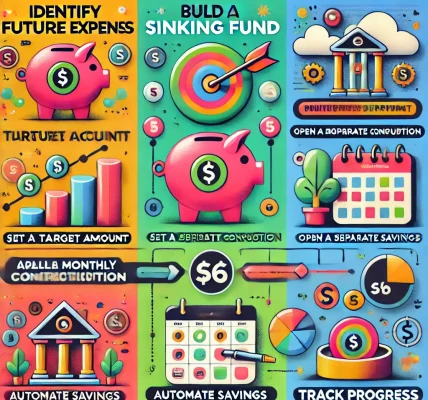Managing your finances can be challenging, but budgeting becomes even trickier when your income varies from month to month. Whether you’re a freelancer, gig worker, or entrepreneur, inconsistent income makes it harder to plan and save effectively. However, with the right strategies, you can create a stable budget that accommodates irregular earnings and safeguards your financial goals.
In this guide, we’ll explore:
- Why budgeting is essential for freelancers and gig workers
- Steps to create a budget with fluctuating income
- Practical tips to stay consistent and avoid financial stress
- How to build a financial cushion for lean months
Why Budgeting is Crucial for Freelancers and Gig Workers
Freelancers and gig workers often experience income volatility, making it difficult to predict earnings and manage expenses. Here’s why budgeting is essential:
1. Maintains Financial Stability
A well-planned budget helps you stay financially secure during low-income months, ensuring that you can cover essential expenses.
2. Prevents Overspending
When income varies, it’s easy to overspend during high-earning months. A budget helps you allocate money wisely and avoid financial pitfalls.
3. Enables Long-Term Planning
A consistent budget allows you to work toward long-term financial goals, such as saving for retirement or buying a home.
4. Reduces Stress and Anxiety
Knowing where your money is going gives you peace of mind and minimizes financial uncertainty.
Step-by-Step Guide to Creating a Budget with Irregular Income
Step 1: Determine Your Average Monthly Income
Since your income fluctuates, calculate your average monthly income by reviewing the past 6–12 months of earnings.
- Add up your total earnings over the past year
- Divide the total by the number of months to get your monthly average
📊 Pro Tip: Be conservative by using the lower end of your average income to avoid overestimating your earnings.
Step 2: Identify Your Fixed and Variable Expenses
List all your expenses and categorize them as:
- Fixed Expenses: Rent, utilities, insurance, loan payments
- Variable Expenses: Groceries, transportation, entertainment
- Irregular Expenses: Annual subscriptions, car maintenance, holidays
✅ Pro Tip: Prioritize essential expenses and cut back on discretionary spending during low-income months.
Step 3: Establish a Bare-Bones Budget
Create a bare-bones budget that covers only essential expenses. This budget acts as a safety net during lean months and helps you stay afloat.
- Rent/Mortgage: $1,000
- Utilities: $150
- Groceries: $300
- Insurance: $100
🎯 Pro Tip: Reduce non-essential spending during slow months and redirect any surplus to savings.
Step 4: Set Up an Emergency Fund
An emergency fund is essential for freelancers and gig workers to weather financial downturns. Aim to save 3-6 months’ worth of essential expenses.
- Start small by contributing a percentage of each paycheck
- Use a high-yield savings account for better returns
🏦 Pro Tip: Automate your savings to ensure consistency, even during high-earning months.
Step 5: Use a Percentage-Based Budgeting System
When your income fluctuates, a percentage-based system works better than fixed allocations. Allocate percentages of your income to different categories:
- 50% Needs: Rent, groceries, insurance
- 30% Wants: Entertainment, dining out, hobbies
- 20% Savings and Debt Repayment: Emergency fund, retirement, and debt payments
📊 Pro Tip: Adjust these percentages based on your financial goals and income stability.
Step 6: Pay Yourself a Fixed Salary
Create a business account where you deposit all freelance or gig payments. Then, pay yourself a fixed salary each month from this account to simulate a consistent paycheck.
- Transfer a set amount each month to your personal account
- Leave the remaining balance in your business account to cover lean months
📈 Pro Tip: Increase your salary only when your average income consistently grows.
Practical Tips to Stay Consistent with Irregular Income
1. Track Your Income and Expenses Religiously
Frequent tracking helps you identify patterns and make informed decisions about spending and saving.
- Use budgeting apps like Mint or YNAB to automate tracking
- Review your income and expenses weekly or monthly
📱 Pro Tip: Track both large and small expenses to avoid overspending.
2. Anticipate Lean Months and Plan Accordingly
Be prepared for slow periods by saving a portion of your high-income months for future lean months.
🔄 Pro Tip: Create a buffer fund specifically for slow months to avoid financial stress.
3. Diversify Your Income Streams
Relying on a single source of income increases financial risk. Explore multiple revenue streams to stabilize your earnings.
- Offer complementary services
- Explore passive income opportunities
- Build a portfolio of recurring clients
📊 Pro Tip: Set realistic income goals for each stream to balance effort and reward.
4. Review and Adjust Your Budget Regularly
Since your income is inconsistent, review your budget regularly and adjust allocations based on current earnings.
🔄 Pro Tip: Conduct a monthly review to ensure your budget aligns with your financial goals.
How to Build a Financial Cushion for Lean Months
1. Create a Sinking Fund
Set aside money in a sinking fund specifically designed for lean months. This acts as a buffer during times of reduced income.
🏦 Pro Tip: Allocate a fixed percentage of your high-income months to this fund.
2. Use Windfalls Wisely
When you receive unexpected income, allocate a portion toward your emergency fund or debt repayment.
💸 Pro Tip: Aim to save at least 50% of windfalls for long-term stability.
3. Invest in Skill Development
Continuous learning increases your earning potential, allowing you to charge higher rates or explore new income streams.
🎓 Pro Tip: Dedicate a portion of your budget to professional development.
4. Negotiate Better Payment Terms
Freelancers and gig workers can improve cash flow by negotiating better payment terms with clients.
💬 Pro Tip: Request partial upfront payments or shorter payment cycles.
Common Mistakes to Avoid When Budgeting with Irregular Income
1. Underestimating Expenses
Failing to account for irregular expenses can leave you short on cash. Be sure to include all potential costs in your budget.
2. Failing to Save During High-Income Months
Spending everything during high-earning months without saving for lean times can lead to financial instability.
3. Relying Too Much on Credit
Using credit cards to cover expenses during low-income months can lead to a debt spiral.
Conclusion
Budgeting with irregular income may seem challenging, but with careful planning and discipline, you can create a system that provides financial stability and peace of mind. By tracking your income, setting realistic spending limits, and building an emergency fund, freelancers and gig workers can successfully navigate the ups and downs of variable earnings.
Take control of your finances today and set yourself up for long-term success!




